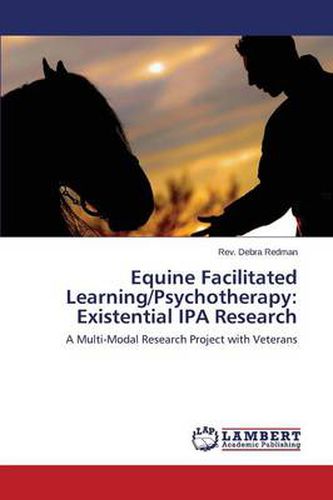Readings Newsletter
Become a Readings Member to make your shopping experience even easier.
Sign in or sign up for free!
You’re not far away from qualifying for FREE standard shipping within Australia
You’ve qualified for FREE standard shipping within Australia
The cart is loading…






This title is printed to order. This book may have been self-published. If so, we cannot guarantee the quality of the content. In the main most books will have gone through the editing process however some may not. We therefore suggest that you be aware of this before ordering this book. If in doubt check either the author or publisher’s details as we are unable to accept any returns unless they are faulty. Please contact us if you have any questions.
Equine assisted therapies are difficult to research using evidenced-based measures because of the many independent variables that influence the outcome of the process. One of the themes that runs through most of the literature, from books, press releases, human interest stories, to quasi-experimental studies, is that working with horses is both experiential and existential in nature (Berget & Ihlebaek, 2011; EAGALA, n.d.;Klontz, Bivens, Leinart, & Klontz, 2007; Lipovsky, 2011; McConnell, 2010; PATH, 2012; Peterson, 2010). The unique lived experiences that each person has while participating in equine assisted therapies make it difficult to say for certain whether observed changes are the result of the treatment itself; however, the changes that are observed can be measured using a mixed-methods research approach. This project demonstrates an application of Interpretive Phenomenological Analysis using an Existential Psychology perspective coupled with a quantitative survey with veterans.
$9.00 standard shipping within Australia
FREE standard shipping within Australia for orders over $100.00
Express & International shipping calculated at checkout
This title is printed to order. This book may have been self-published. If so, we cannot guarantee the quality of the content. In the main most books will have gone through the editing process however some may not. We therefore suggest that you be aware of this before ordering this book. If in doubt check either the author or publisher’s details as we are unable to accept any returns unless they are faulty. Please contact us if you have any questions.
Equine assisted therapies are difficult to research using evidenced-based measures because of the many independent variables that influence the outcome of the process. One of the themes that runs through most of the literature, from books, press releases, human interest stories, to quasi-experimental studies, is that working with horses is both experiential and existential in nature (Berget & Ihlebaek, 2011; EAGALA, n.d.;Klontz, Bivens, Leinart, & Klontz, 2007; Lipovsky, 2011; McConnell, 2010; PATH, 2012; Peterson, 2010). The unique lived experiences that each person has while participating in equine assisted therapies make it difficult to say for certain whether observed changes are the result of the treatment itself; however, the changes that are observed can be measured using a mixed-methods research approach. This project demonstrates an application of Interpretive Phenomenological Analysis using an Existential Psychology perspective coupled with a quantitative survey with veterans.